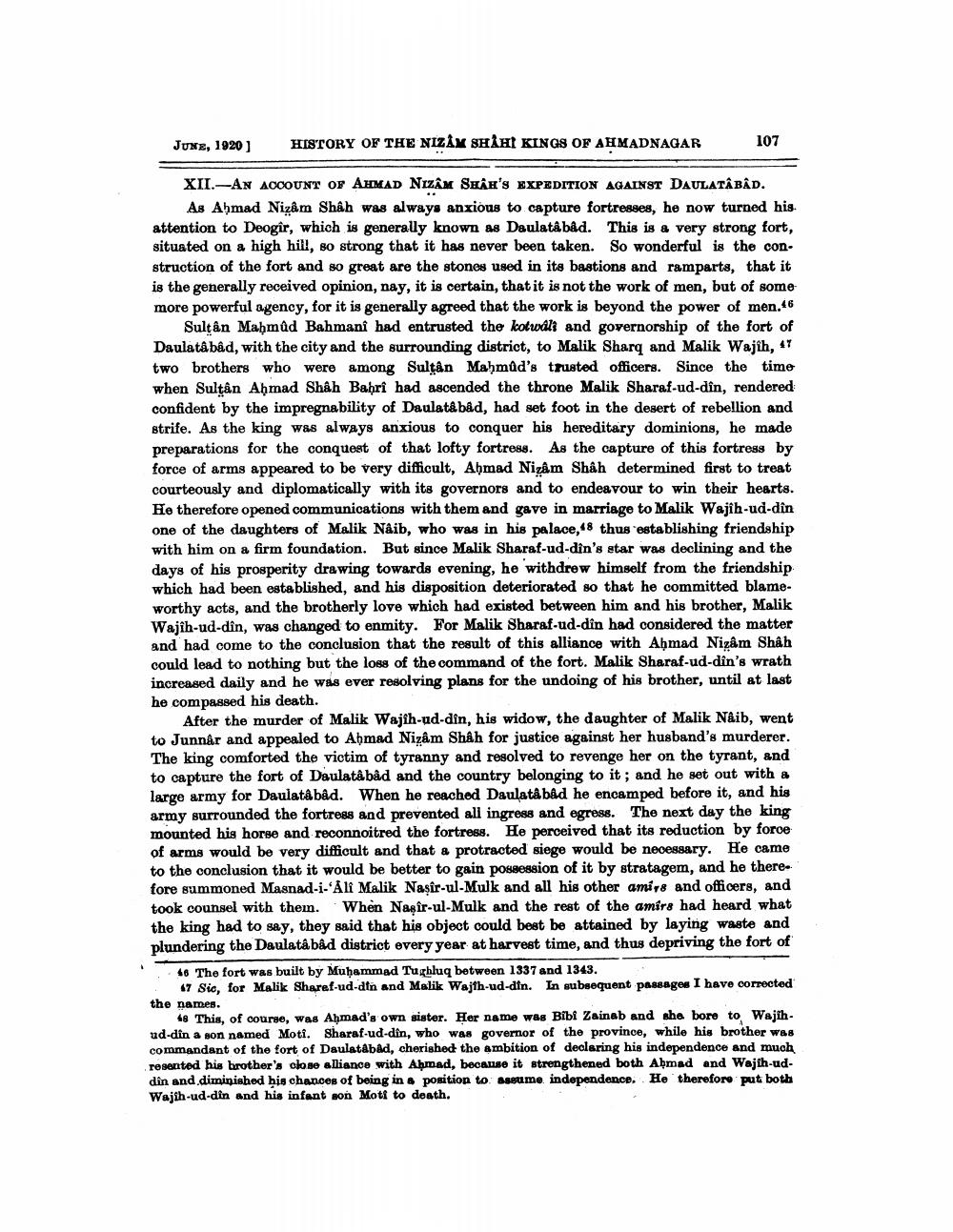________________
Juxz, 1920]
HISTORY OF THE NIZÅN SHAH KINGS OF AHMADNAGAR
107
XII.-AN ACCOUNT OF AHMAD NIZÂM SHAR'S EXPEDITION AGAINST DAULATABAD.
As Ahmad Nizâm Shâh was always anxious to capture fortresses, he now turned his attention to Deogir, which is generally known as Daulatâ båd. This is a very strong fort, situated on a high hill, so strong that it has never been taken. So wonderful is the construction of the fort and so great are the stones used in its bastions and ramparts, that it is the generally received opinion, nay, it is certain, that it is not the work of men, but of some more powerful agency, for it is generally agreed that the work is beyond the power of men.46
Sultan Mahmûd Bahmani had entrusted the kotwdlt and governorship of the fort of Daulatå båd, with the city and the surrounding district, to Malik Sharq and Malik Wajih, 47 two brothers who were among Sultan Mahmûd's trusted officers. Since the time when Sultan Ahmad Shah Bahri had ascended the throne Malik Sharaf-ud-din, rendered confident by the impregnability of Daulatå båd, had set foot in the desert of rebellion and strife. As the king was always anxious to conquer his hereditary dominions, he made preparations for the conquest of that lofty fortress. As the capture of this fortress by force of arms appeared to be very difficult, Ahmad Nizam Shah determined first to treat courteously and diplomatically with its governors and to endeavour to win their hearts. He therefore opened communications with them and gave in marriage to Malik Wajih-ud-din one of the daughters of Malik Näib, who was in his palace,8 thus 'establishing friendship with him on a firm foundation. But since Malik Sharaf-ud-din's star was declining and the days of his prosperity drawing towards evening, he withdrew himself from the friendship which had been established, and his disposition deteriorated so that he committed blameworthy acts, and the brotherly love which had existed between him and his brother, Malik Wajih-ud-din, was changed to enmity. For Malik Sharaf-ud-din had considered the matter and had come to the conclusion that the result of this alliance with Ahmad Nizam Shah could lead to nothing but the loss of the command of the fort. Malik Sharaf-ud-dîn's wrath increased daily and he was ever resolving plans for the undoing of his brother, until at last he compassed his death.
After the murder of Malik Wajih-ud-din, his widow, the daughter of Malik Naib, went to Junnêr and appealed to Ahmad Nizam Shah for justice against her husband's murderer. The king comforted the victim of tyranny and resolved to revenge her on the tyrant, and to capture the fort of DaulatAbåd and the country belonging to it; and he set out with a large army for DaulatAbåd. When he reached Daulatåbåd he encamped before it, and his army surrounded the fortress and prevented all ingress and egress. The next day the king mounted his horse and reconnoitred the fortress. He perceived that its reduction by force of arms would be very difficult and that a protracted siege would be necessary. He came to the conclusion that it would be better to gain possession of it by stratagem, and he there. fore gummoned Masnad-i-Ali Malik Nasir-ul-Mulk and all his other amire and officers, and took counsel with them. When Naşir-ul-Mulk and the rest of the amirs had heard what the king had to say, they said that his object could best be attained by laying waste and plundering the Daulatábåd district every year at harvest time, and thus depriving the fort of
46 The fort was built by Muhammad Tughluq between 1337 and 1343.
17 Sic, for Malik Sharef-ud-din and Malik Wajth-ud-din. In subsequent passages I have corrected the names.
48 This, of course, was Ahmad's own sister. Her name was Bibf Zainab and she bore to Wajih. ud-din a son named Moti. Sharaf-ud-din, who was governor of the province, while his brother was commandant of the fort of Daulatabad, cherished the ambition of declaring his independence and much resented his brother's close alliance with Ahmad, because it strengthened both Abmad and Wajih-uddin and diminished his chances of being in a position to assume independence. He therefore put both Wajih-ud-din and his infant son Mott to death.




